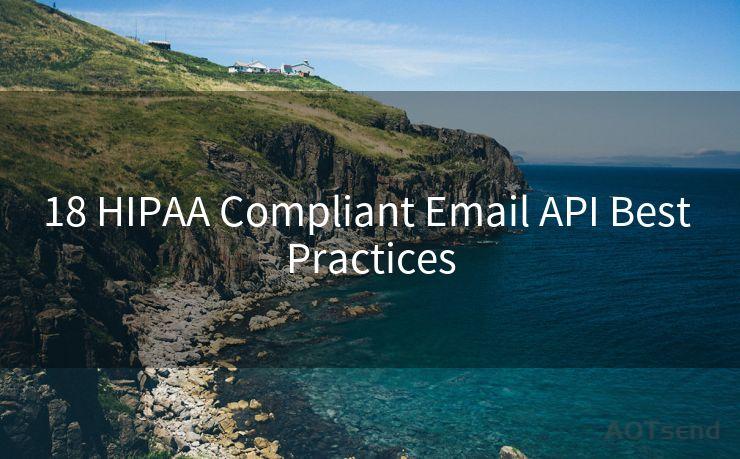18 HIPAA Compliant Email API Best Practices




When it comes to handling sensitive patient information in the healthcare industry, compliance with the Health Insurance Portability and Accountability Act (HIPAA) is crucial. Email communication, in particular, can be a minefield if not managed correctly. In this article, we'll explore 18 best practices for implementing a HIPAA-compliant email API, ensuring the secure transmission of protected health information (PHI).
1. Understand HIPAA Requirements
Before integrating an email API, it's essential to have a thorough understanding of HIPAA requirements. This includes familiarizing yourself with the Privacy Rule, which governs the use and disclosure of PHI.
2. Choose a HIPAA-Compliant Email Provider
Select an email service provider that offers HIPAA-compliant solutions. Look for providers who have undergone rigorous audits and can guarantee the security of your data.
3. Encrypt All Emails
Ensure that all emails containing PHI are encrypted both in transit and at rest. This adds an extra layer of security to sensitive information.
4. Implement Access Controls
Restrict access to PHI to authorized personnel only. Utilize role-based access controls to determine who can send, receive, or view PHI-containing emails.
5. Regularly Update Software and Security Patches
Keep your email system and all related software up to date with the latest security patches to prevent any vulnerabilities.
6. Use Secure Authentication Methods
Implement strong authentication methods, such as multi-factor authentication, to protect against unauthorized access to the email system.
7. Establish Clear Policies and Procedures
Develop comprehensive policies and procedures for handling PHI in emails, including guidelines for sending, receiving, and storing such information.
8. Train Employees on HIPAA Compliance
Provide regular training to employees on HIPAA compliance, focusing on the proper handling of PHI in emails.

9. Monitor and Audit Email Communications
Regularly monitor and audit email communications to ensure compliance with HIPAA regulations.
10. Implement Automatic Logoff
Set up the system to automatically log off users after a period of inactivity, reducing the risk of unauthorized access.
11. Use Secure Connections
Ensure that all email communications are transmitted over secure connections, such as SSL/TLS, to prevent data interception.
12. Avoid Using Auto-Forwarding
Disable auto-forwarding features to prevent PHI from being inadvertently sent to unauthorized recipients.
🔔🔔🔔
【AOTsend Email API】:AOTsend is a Managed Email Service for sending transactional emails. Support Email Types: reminders, authentication, confirmations, notifications, verification codes, invoices, password resets, account activations, billing statements, two-factor authentication (2FA), and one-time passwords (OTP) emails, etc. $0.28 per 1000 Emails. 99% Delivery, 98% Inbox Rate.
You might be interested in:
Why did we start the AOTsend project, Brand Story?
What is a Managed Email API, How it Works?
Best 25+ Email Marketing Platforms (Authority,Keywords&Traffic Comparison)
Best 24+ Email Marketing Service (Price, Pros&Cons Comparison)
Email APIs vs SMTP: How they Works, Any Difference?
13. Implement Data Loss Prevention (DLP) Tools
Utilize DLP tools to identify and prevent the unauthorized transmission of PHI.
14. Regularly Backup Email Data
Maintain regular backups of all email data to ensure recoverability in case of any system failures or data breaches.
15. Establish Incident Response Plans
Prepare incident response plans to address potential data breaches or security incidents involving PHI.
16. Conduct Regular Risk Assessments
Periodically assess the risks associated with email communications to identify and mitigate any potential vulnerabilities.
17. Document All Policies and Procedures
Maintain detailed documentation of all policies and procedures related to email communications and HIPAA compliance.
18. Stay Updated on HIPAA Regulations
Keep abreast of any changes to HIPAA regulations to ensure continued compliance.
By following these 18 best practices, healthcare organizations can significantly reduce the risk of HIPAA violations and protect the privacy and security of sensitive patient information. Remember, compliance is not just about avoiding penalties; it's about maintaining the trust of your patients and protecting their privacy rights.




Scan the QR code to access on your mobile device.
Copyright notice: This article is published by AotSend. Reproduction requires attribution.
Article Link:https://www.mailwot.com/p5701.html



